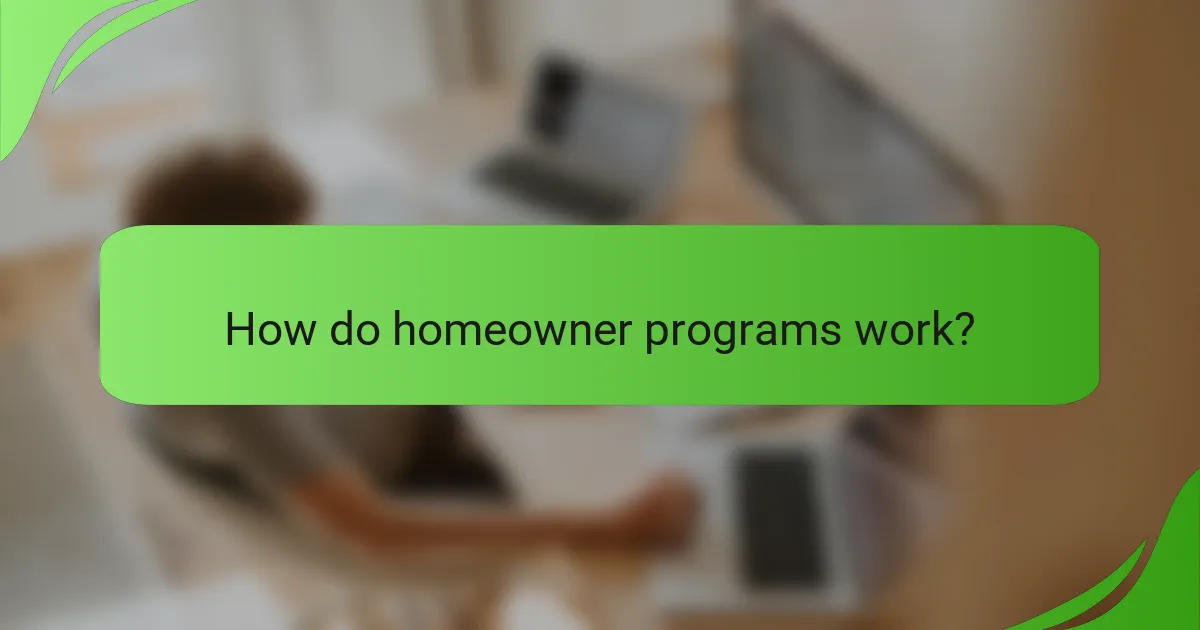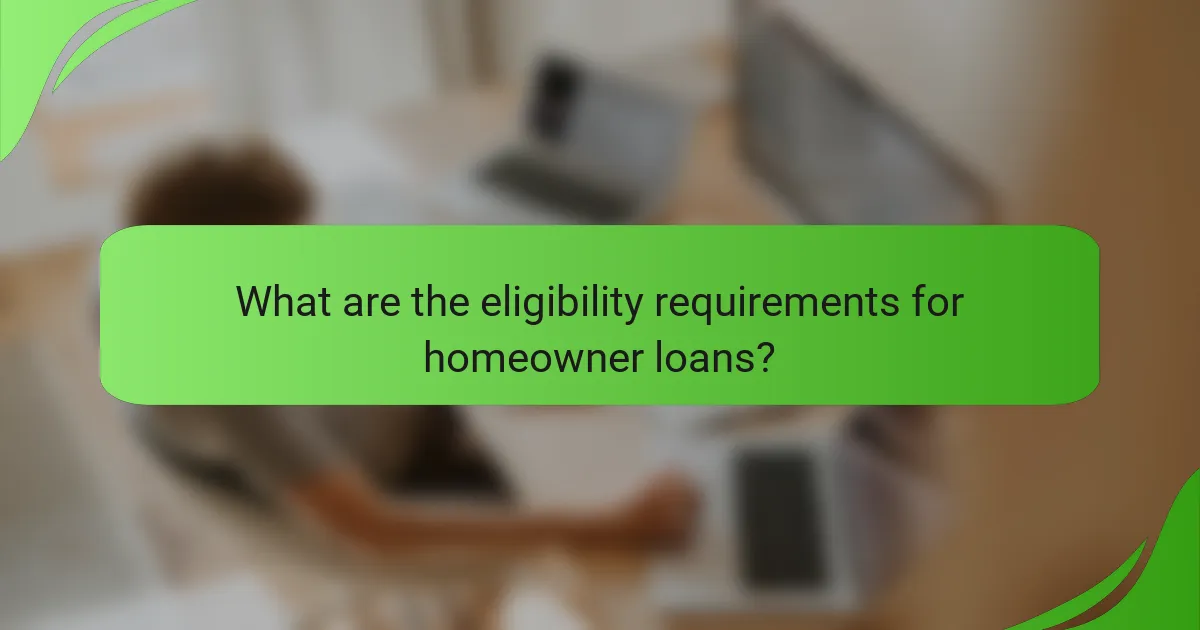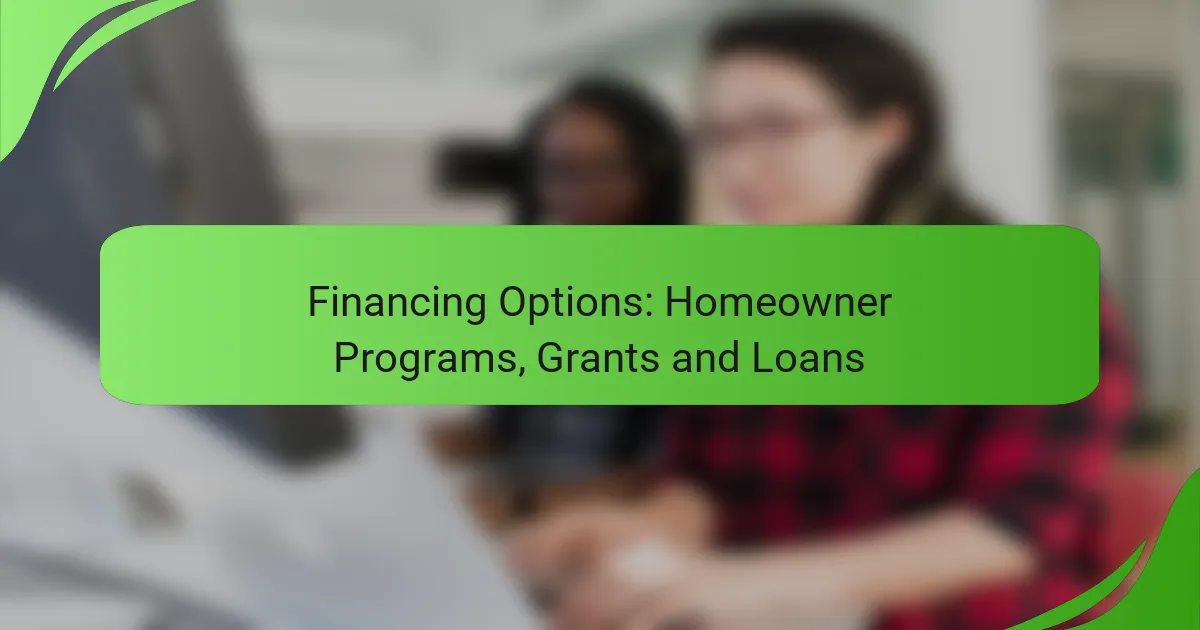Homeowners in the US have access to a variety of financing options, including government-backed loans and grants, which are tailored to support diverse financial situations. These programs aim to facilitate homeownership by providing assistance for purchasing, refinancing, and making essential home repairs, particularly for low- to moderate-income households. With the right resources, individuals can alleviate the financial burdens associated with owning a home and improve their living conditions.

What financing options are available for homeowners in the US?
Homeowners in the US have several financing options, including government-backed loans and conventional financing. These options cater to various financial situations, making homeownership more accessible through programs designed to assist with purchasing or refinancing homes.
Federal Housing Administration (FHA) loans
FHA loans are government-insured mortgages that allow for lower down payments and more flexible credit requirements. Typically, borrowers can secure an FHA loan with a down payment as low as 3.5%, making it an attractive option for first-time homebuyers.
These loans come with mortgage insurance premiums, which can increase overall costs. However, the lower initial investment can help many buyers enter the housing market sooner.
USDA Rural Development loans
USDA loans are designed for low to moderate-income borrowers in eligible rural areas. These loans often require no down payment and have competitive interest rates, making them a viable option for those looking to purchase homes outside urban centers.
To qualify, applicants must meet specific income limits and the property must be located in a designated rural area. This financing can significantly reduce the upfront costs of homeownership for eligible buyers.
VA loans for veterans
VA loans are available to veterans, active-duty service members, and certain members of the National Guard and Reserves. These loans offer benefits such as no down payment, no private mortgage insurance, and competitive interest rates.
To qualify, applicants must obtain a Certificate of Eligibility from the VA. This program is an excellent option for veterans looking to purchase a home with minimal upfront costs and favorable loan terms.
Conventional loans
Conventional loans are not backed by the government and typically require a higher credit score and a larger down payment compared to FHA or VA loans. Borrowers usually need a down payment of at least 5% to 20%, depending on the lender’s requirements.
These loans can be either conforming, adhering to Fannie Mae and Freddie Mac guidelines, or non-conforming. They may offer more flexibility in terms of property types and loan amounts, but they often come with stricter qualification criteria.
Home equity lines of credit (HELOC)
A HELOC allows homeowners to borrow against the equity in their homes, providing a revolving line of credit. This option is useful for funding home improvements, consolidating debt, or covering unexpected expenses.
Typically, HELOCs have variable interest rates and require a minimum amount of equity in the home. Homeowners should be cautious, as failing to repay can result in losing their home, making it essential to borrow responsibly.

What grants are available for homeowners in the US?
Homeowners in the US can access various grants designed to assist with home repairs, energy efficiency improvements, and financial support. These programs often target low- to moderate-income households and can significantly alleviate the financial burden of homeownership.
Community Development Block Grant (CDBG)
The Community Development Block Grant program provides federal funds to local governments for housing and community development projects. Homeowners may benefit from this program through funding for home repairs, renovations, and improvements aimed at enhancing living conditions.
Eligibility typically depends on income levels and the specific needs of the community. Homeowners should check with their local housing authority to understand the application process and available funding amounts.
Weatherization Assistance Program (WAP)
The Weatherization Assistance Program helps low-income families reduce their energy costs by improving the energy efficiency of their homes. This program offers services such as insulation, air sealing, and heating system repairs at no cost to eligible homeowners.
To qualify, applicants usually need to meet income guidelines and may be required to provide documentation of their financial situation. Interested homeowners should contact their local WAP provider for specific details and assistance.
Homeowner Assistance Fund (HAF)
The Homeowner Assistance Fund was established to provide financial assistance to homeowners facing hardships due to the COVID-19 pandemic. This fund can help cover mortgage payments, property taxes, and utility bills, preventing foreclosure and loss of housing.
Homeowners can apply for assistance through their state’s HAF program, which may have specific eligibility criteria and application procedures. It’s essential to act quickly, as funding may be limited and available on a first-come, first-served basis.
State-specific housing grants
Many states offer their own housing grants tailored to local needs, which may include funding for home repairs, down payment assistance, or energy efficiency upgrades. These grants can vary significantly in terms of eligibility and funding amounts.
Homeowners should research their state’s housing finance agency or local government websites to find specific programs available in their area. It’s advisable to keep an eye on deadlines and application requirements to maximize the chances of receiving assistance.

How do homeowner programs work?
Homeowner programs are designed to assist individuals in purchasing or maintaining their homes through financial support, such as grants or low-interest loans. These programs often target first-time buyers or those in specific income brackets, making homeownership more accessible.
Eligibility criteria for homeowner programs
Eligibility for homeowner programs typically depends on factors such as income level, credit score, and residency status. Many programs require applicants to demonstrate a stable income, often within a certain percentage of the area median income.
Some programs may also have specific requirements related to the type of property being purchased, such as single-family homes or properties in designated revitalization areas. It’s essential to review the specific criteria for each program, as they can vary significantly by state or locality.
Application process for homeowner assistance
The application process for homeowner assistance generally involves several key steps. First, interested individuals should gather necessary documentation, including proof of income, tax returns, and credit history. This information helps assess eligibility and determine the level of assistance available.
Next, applicants typically submit their application through the relevant housing authority or program administrator. Some programs may offer online applications, while others require in-person submissions. After submission, there may be a waiting period for approval, during which applicants should be prepared to provide additional information if requested.

What are the benefits of homeowner financing programs?
Homeowner financing programs offer various advantages, including lower costs and improved access to homeownership. These programs can help individuals secure loans with favorable terms, making it easier to purchase or renovate a home.
Lower interest rates
One of the primary benefits of homeowner financing programs is the potential for lower interest rates compared to traditional loans. Many programs are designed to support first-time buyers or low-income families, often resulting in rates that can be significantly lower than market averages.
For example, while conventional mortgage rates might hover around 4-5%, some government-backed programs can offer rates in the low 3% range. This difference can lead to substantial savings over the life of the loan.
Flexible repayment terms
Homeowner financing programs frequently provide flexible repayment terms that can accommodate various financial situations. Borrowers may find options ranging from extended loan durations to deferred payment plans, which can ease monthly financial burdens.
For instance, some programs allow for 30-year fixed-rate mortgages, while others might offer shorter terms or interest-only periods. It’s essential to evaluate these options to find a plan that aligns with your budget and long-term financial goals.
Access to additional resources
Many homeowner financing programs come with access to additional resources, such as financial counseling, homebuyer education courses, and grants for down payments. These resources can empower borrowers with the knowledge and support needed to make informed decisions.
For example, participating in a homebuyer education course can provide insights into budgeting, credit management, and the home buying process. Additionally, some programs may offer grants that do not require repayment, further reducing the financial burden on new homeowners.

What are the eligibility requirements for homeowner loans?
Eligibility requirements for homeowner loans vary by lender and program but generally include factors such as credit score, income, and property type. Understanding these criteria can help potential borrowers prepare and increase their chances of approval.
Credit score criteria
Most lenders require a minimum credit score for homeowner loans, typically ranging from 620 to 640 for conventional loans. However, government-backed loans, like FHA loans, may allow scores as low as 580, or even lower with a larger down payment.
A higher credit score can lead to better loan terms, including lower interest rates and reduced mortgage insurance premiums. It’s advisable to check your credit report for errors and improve your score before applying.
Consider maintaining a low credit utilization ratio and making timely payments to enhance your creditworthiness. Regularly monitoring your credit can help you stay informed about your standing and readiness for a loan application.
